More than 150 Hindi films release in Indian cinemas every year. That’s right – the number could be far more too – but this is just a very informed estimate. This not only includes the usual festival blockbusters, Khan vehicles, star-son-daughter vehicles, indie duds, indie gems, Sunny Leone ‘films’, mandatory Bipasha Basu ‘horrex’ sagas and ordinary rural satires, but also around 20% of “B-movies”.
B-movies is what you get when drunk old-school producers get off their tiger-skinned carpets in gold-plated drawing rooms with their satin-robed healthy wives and decide to “invest” their cash into a fillum production that nobody will watch, and only their own yes-men and equally shady sidekicks will acknowledge. These movies aren’t made with the intention of showcasing it as cinema in halls; they’re only made so that cheap booze, deep-necked starlets and pointy boots can grace dimly-lit premieres in single-screen halls. Just for this one night, and for the fleeting touch of bright lights and hungry photographers, these films enter and exit before you can say ‘Rakhi Sawant’.
In 2015, there were a whole bunch of such unmentionables. No formidable film critic is usually spotted within miles of such events, but our intrepid analyst scourged the darkest corners of smelly, stuffy preview theatres in the suburbs – and came away alive.
Here is his list – and impassioned notes – of his experiences with each of these hilarious titles. Some of them are exceptionably bad misfiring indies, and some are just sleazy, horrific, forgettable exercises in how not to write/make movies.
JANUARY
MUMBAI CAN DANCE SAALA
The first Hindi film of 2015 had Rakhi Sawant as a bar-girl mentor screaming “you jhopadpatti” at all her ‘students’ in Dubai, and Shakti Kapoor (a.k.a C-grade Stanley Tucci from ‘The Devil Wears Prada’) as a gay fashion designer spouting lyrical item lines like “Yeh hai Anna, sabko khilata hai Ganna!” His flowery shirts are tight, and we are given glimpses of his surprisingly pale belly fat. There’s also a villainous chap called ‘Badshah’ who strides around to ‘Badshah’ chants, has an item song called ‘Badshah’ fashioned on him. No, this isn’t about a dance competition; it’s director Sachindra Sharma’s bizarre based-on-real-events interpretation of famous bar dancer Tarannum Khan’s life. The actress playing this woman does resemble Khan in her heyday. If only this film resembled a film.
TAKE IT EASY
The Raj Zutshi starrer (yes, there is such a thing) has a 40-minute inter-school race climax and resembles an endless motivational presentation. Every millisecond is milked for all its worth. There are more reaction shots, slow-mo kicks, running legs, Jo Jeeta hangovers, crowd shots and parent epiphanies than in Amole Gupte’s entire filmography. The film is supposed to be about the unreal expectations modern-day parents have of their young children – and tells us the story of two kids, an aspiring astronaut (so that he can get away from this movie) whose bitter Ex-Olympian father (Zutshi) wants him to be an athlete and an aspiring athlete whose folks want him to get straight As. Every scene begins with them getting slapped. Viewers feel much like them by the end.
FEBRUARY
JAI JAWAAN JAI KISAAN
It’s ironic that perhaps the worst film of the year in any form – more of a malfunctioning sound-and-light show than an exercise in filmmaking – is a biopic on India’s second Prime Minister Lal Bahadur Shastri, chronicling the happenings around his famous ‘Jai Jawaan Jai Kisaan’ slogan during the 1965 Indo-Pak war. The production is so stark that Indian extras with dyed hair and powdered cheeks are made to portray arrogant Englishmen. A phantom cow moos at the end of glycerin-fueled village scenes. Looping ambience tracks seem to have been recorded at Jogeshwari Station’s noisy railway crossing. Milestones are displayed with abrupt newspaper headlines, and eras are realised by varying mole sizes on the faces of actors playing the beleaguered PM at different ages.
MSG: MESSENGER OF GOD
Gurmeet Ram Rahim Singh, the leader of controversial spiritual sect Dera Sacha Sauda, is convinced that he can expand his tribe of fifty million (estimated) followers. He explodes from icy hills, descends in hot-air ‘Rock Papa’ balloons, struts around in rainbow-colored crochet overalls and sings about deleting sadness and inserting simcards of happiness. He warns, in various Sehgal-Psy dance-rap variations, against the ill effects of drugs and alcohol—coincidentally the two vices required to sit through this surreal experience. In short, this is not a film – and MSG 2, which continued this cruel joke in the name of cinema 8 months later, will not be included in this list of self-respecting B-movies.
MONSOON
Monsoon is the A-rated movie that ALMOST earned the privilege of replacing Dilwale Dulhaniya Le Jayenge at Maratha Mandir after a record 20-year run.
It continues a disturbing trend—where filmmakers invade a beautiful Indian hill station to shoot their C-grade content, thereby diluting its pure imagery and aura for future tourists like us. In this Dalhousie-based chotti-si-love-story-styled seedy effort, a 15-year old Sikh schoolboy falls for an extremely fashionable 28-year-old married woman. She’s not exactly a cougar, but I’m pretty sure some of her pallu-dropping clips from here will end up on an adult website. Her husband is a forest officer who looks destined to be bumped off as soon as he sports a moustache. When Mrs. Robinson becomes the ‘black widow’ of this town, schoolboy still dreams about her in ancient states of undress: as a violinist, teacher, car-washer, pedophile and bikini-clad dog-walker, subject to moody hormones. There is also a moronic villain, with a sidekick who bites his own lips as if he, and not Miss Steele, was trapped in Christian Grey’s Red Room of Pain.
AB TAK CHAPPAN 2
Knowing Sadhu Agashe, and Nana Patekar’s trademark eccentricities that defined his backbone in Shimit Amin’s top-drawer ‘Ab Tak Chappan’, his return out of retirement from a quiet Goan fisher-village would have been more believable if, say, perhaps his dog died. Or his boat was stolen. Or if director Aejaz Gulab had decided to not use grainy handy cameras. Or if he was asked to actually portray emotions. You’d think Agashe crossed over to the dark side after losing his wife, but he is coaxed back and set up for an astoundingly similar tragedy all over again. Cameras weave around like intoxicated mosquitoes across hairy legs up broad torsos, under fishbowls to sweet boxes, from bottle caps to ballpoints. The editing desperately tries to make a statement; flying pigeons are inserted when a villain is named, environments are abruptly fitted into indoor conversations. You get the gist. Ramgopal Varma’s genes have traveled far and wide.
MARCH
BARKHAA
An 11 PM premiere in the “red area” of a multiplex with free booze, ‘bites’ and the prestigious presence of Rakhi Sawant and KRK. The experience actually overshadowed the movie. Another movie about an ex-bar dancer, which is why perhaps method actress Miss Sawant attended this show – to draw parallels with her own ‘Mumbai Can Dance Saala’ role. Mainstream Hindi cinema’s depiction of bargirls is straightforward: trash-talking roadies by night, virginal white-salwaar angels by day. There is such a vast difference between these two avatars that it becomes more difficult to digest than Puneet Issar playing a respected lawyer. Lest we forget, we are reminded repeatedly that bargirls are humans too. Especially during the end-credit item song, whose lyrics translate to “Come come, I’m Naughty Number One, hotter than hottie!”
BLACK HOME
It’s a bit ironic when exploitative social dramas about sexual exploitation and child trafficking—atrocities committed at remand homes, corporate sabotage, ethical ambiguity, begging mafias, flesh trade—end with deep reverberating voices quoting real statistics. This, after a shameless item song interrupts one of many escape attempts by the long-suffering girls, led by beedi-smoking Mirchi (Chitrashi Rawat; the pocket-sized Chak De! India striker). Greedy filmmakers seem to have even managed to create a formula out of portraying hard-hitting, inspired-by-real-events newspaper-ish stories. All I remember here is Ashutosh Rana’s nth irrelevant appearance and Achint Kaur’s nth heightened cruel-warden act.
BADMASHIYAAN
This is the kind of incompetent film where secondary actors use words like ‘handsome’ and ‘heartless’ as nouns, where tertiary actors begin every sentence with ‘Oye!’ to reiterate ethnic clichés, where liberal women lick their lips in bedrooms at steroid-boosted males stripping to hip-hop beats, where lilting Bhatt-template songs—usually sounds of unrequited love—are used to show blossoming love, where random couples give their two bits about love, and where drops of urine and fake diamonds are given more screen-time than the leads. Tragically, it is Filmistaan’s talented lead actor Sharib Hashmi that lends his voice, versatility and fake moustache to an imbecilic character of a Jatt don caught in a cobweb of love triangles, con-girls, theres-something-about-Mary detectives and a wooden young chap named Siddhant Kapoor – whose last appearance, in Tutiya Dil (2012) shows that nothing except his biceps have evolved.
DILLIWALI ZAALIM GIRLFRIEND
Oh, the title. My eyes. Perpetually pained and whiny lover Divyendu Sharma – who continues to lose his way after the original Pyaar Ka Panchnama – appears in yet another confused adaptation of the Khosla Ka Ghosla template. Instead of a plot of land, his loan-funded car is stolen. Mere Dad Ki Maruti? Of course not. Jackie Shroff plays the suspiciously accented Punjabi shark behind the racket here, and Dhruv and his pals’ harebrained attempts to bring about his downfall form major sequences of nothingness in this film. Long legs, heaving breasts, blonde dancers and jewelry jostle for sweaty space from frame one in a profound item song. This is often Bollywood’s generic introduction to Paharganj-weds-GK tales, and a filmmaker’s way of telling us that no matter what the film is about, titillation and commercialism mean the same thing.
DIRTY POLITICS
K.C. Bokadia, the master of 80s potboilers, is no small name. But I feel sorry for the large crews that work hard on these goodwill efforts, for they’re always at the mercy of unprogressive creative minds. Loosely based on the Bhanvari Devi sex scandal, Dirty Politics can best be described as Om Puri’s ‘Boom’. In Lalit Modi’s Rajasthan, Puri plays a dirty old minister with his heart and groins set on a dancer named Anokhi Devi (Mallika Sherawat, of course). A suggestively worded song is dedicated to them getting hot and heavy between the sheets. This is not something that can be unseen. Bras snap, lips meet, his nose snakes down her thighs through her cleavage…and I can’t go on. Naturally, a blackmail subplot hinges on this sensuous scene; a CD with hidden camera footage pops up (zooms, handheld, color coding, tilts—magic!), leaving the political landscape buzzing with sleaze.
DOZAKH: IN SEARCH OF HEAVEN
A stubborn Muslim Cleric, who is entrusted in singing the local Mosque’s namaaz every morning, breaks down when his ‘liberal’ son goes missing. Writer-director and ex-journalist Zaigham Imam, who has adapted these evocative passages from his Hindi-language novel of the same name, should have left them in ink. Varanasi’s unique religious harmony is repeatedly undone by a peculiar lack of filmmaking finesse. Amateur foley effects, unregulated dubbing and sound design make this look like a rough cut; a single cricket-chirping ambience track is used through mornings at different locations, crowds stop buzzing as soon as they’re out of frame, and bat hitting ball sounds like a head hitting a wall. I suppose there’s a poignant message in having a Hindu play a Maulvi, and a Muslim actor essay the role of a Pandit, but such meta indie ‘good-intentioned’ attempts are best left to the confines of an elevated wooden stage.
HEY BRO
Telling our filmmakers to move on from the bastardization of 90s masala is a task steeper than convincing a cricket fan to move on from Sachin Tendulkar. Rotund dance-master Ganesh Acharya has always possessed an infectious energy on screen, but his debut as lead actor looks nothing more than a silly movie made through favours from his superstar pals. If only director Ajay Chandhok had bothered to cultivate Acharya’s music-video zest into the done-to-death ‘twins reunite’ melodrama. Instead, what we get is andaaz-apna-apna sidekicks, leopard-printed heels, ping-pong sound effects, classic dialogues ‘remixed’ as rap songs, and skimpy numbers that rhyme ‘rude’ with ‘dude’ and ‘mood’.
APRIL
BAREFOOT TO GOA
A little boy and his sister who live with their stepmother-level parents in Mumbai, escape to visit their Goa-based deaf-mute grandmother after they discover her unread letters in mum’s cupboard. Most of this 77-minute journey seems to take place in dreary, painful real time. I could hear a lonely fly float around my ear in slow-mo, until it yawned and dropped dead. Long routines unfold, letters are folded and creased, every footstep taken with a stunning lack of pace. This is essentially a short story about and for children stretched to eternity.
HUM BAAJA BAJA DENGE
When you’re done trying to repeat the tongue-twisting title 10 times while intoxicated, the first signs of outdatedness occur when a Golden Retriever is named Tommy, and a Parsi (not Persian) cat is called Popo. Jackie Shroff appears in yet another high-flying, accented special role, speaking in a voice that isn’t his, suave in designer suits and helicopters. Richness is not contagious though, because his kid bro dresses like a fashion street romeo, gem-studded glares leading a dimwitted rock band. Kid bro decides to accidentally kidnap the CM’s daughter to prove that he can make newspaper headlines. That’s right. And this is made by Chandra Barot – the one-hit wonder behind the hugely successful ‘Don’, and nothing to speak of after that.
ISHQ KE PARINDEY
Our filmmakers have milked the cross-border eternal romance angle dry. It’s hard to tell if it’s Indo-Pak tension that provides fodder for these done-to-death stories, or the stories that actually create tension between the nations. Evidently, the latter. In this film, when he can’t find her, he types ‘women from Karachi’ into a search engine, but isn’t bombed with ‘feeling lonely?’ pornographic popups. He then uses blank calls, kite flying and pigeons—in descending order of retro communication. They meet at canteens that have exactly two samosas on every plate, with glossy sandwich photos on clean walls. She mutters something about Pakistani eyes attacking Indian hearts. She runs like slow motion isn’t an option, leaping into the air with the agility of a dancing peacock. In case you’re wondering, shots of panicked pigeons are inserted fifty times in various frame rates, most of which signify the lovers-against-odds struggle.
KAAGAZ KE FOOLS
Vinay Pathak plays a struggling Hindi novelist married to the most horrific nagging housewife I’ve seen. She chides him for his idealism and lack of ambition, driving him away to the world of prostitutes and alcohol. Devdas shouldn’t have been created, if these are the warped interpretations his story results in.
Mugdha Godse plays this ghastly woman, who quite frankly deserves to be shipped off in a sari to an island full of reptiles. The same goes for sultry Raima Sen, who plays a puzzling prostitute with intentions that are indecipherable, until she changes his novel title from ‘Ek Thehri si Zindagi’ to ‘Ek Tharkee ki Zindagi’.
MAY
EXTRAORDINAARI
Think about the genius titular wordplay for a second. Done? This is, apparently, a legit movie. ‘Nothing can stop a desperate woman’ is the tagline. If Chak De! was remade by a newbie adult-film director, with hockey players replaced by struggling models playing ex-prostitutes and rape victims, this debacle is the result. One girl actually answers ‘bed to bathroom and Bangkok’ in an ambiguous, sultry accent when asked what she’d do for fame. Saxophones playing over cold sex, light-eyed Indians playing Londoners, dark-eyed Indians playing gay Italians, haircuts portraying 18-year jumps, while cigarettes and English-speaking suggest loose morals. Believe it.
SABKI BAJEGI BAND
The only thing worse than a terrible movie is when the filmmakers refuse to admit to the terrible-ness (I made that word right now, okay?) of their movie. RJ Anirudh Chawla, who is apparently famous on radio for some reason, is still in denial. Here, he makes a sorry, debauched and pathetic excuse of India’s first “reality movie”. Apparently based on seedy real events, it is a dramatic portrayal of one night spent by 9 Indian celebrities at a farmhouse. The concept of a reality movie is pretty cool, but what follows is a sensationalist, terribly acted and filmed sequence of events that only want to prove this: Everybody in showbiz is a coke-sniffing, voyeuristic, incest-loving, wife-swapping, pedophilic, boss-lusting, leg-spreading, impotent, homophobic and homosexual hypocrite. And one guy actually ends up chewing a condom in this one. Be warned.
KUCH KUCH LOCHA HAI
Indian film directors’ juvenile Girl-Next-Door syndrome continues with this vulgar, crass and cloying adult comedy that relies solely on Sunny Leone’s image—where she happily caters to lecherous vivid middle-aged dreams about heaving breasts in different costumes. She later delivers a monologue about how she feels objectified by the male gaze, only moments after crouching during her morning jog, licking her lips and declaring in a husky voice that she can go on and on. Ram Kapoor stars as a Gujarati middle-aged chap in this one. This is the kind of sex comedy that makes me wonder if director Devang Dholakia wrapped up the shoot every night, met friends at a bar and cackled at lewd jokes about which body part got maximum screen time. Even if he is from a dry state, there’s nothing dry about his fantasies.
JULY
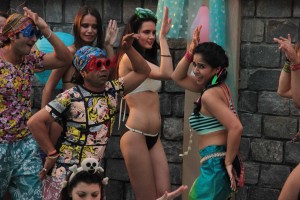
THODA LUTF THODA ISHQ
Fair-bodied dancers sway around holding glasses of flat beer, and lyrics are ripe with metaphors that compare love to the hotness of instant Maggi, tattoos and electricity. The title song even waxes eloquent about how obese girls are bulldozers with pimples, or something of the sort, just to remind us lewd commercial comedies are allowed to get away with anything. Rajpal Yadav and Hiten Tejwani populate this awful attempt at comedy, with names like Jhumroo, Ghungroo and girls called Chuski (that’s right). The movie goes from an aimless female-anatomy-obsessed hustler tale to a F-Grade DDLJ between two halves, while we’re exposed to the radioactive hamming of Rajpal Yadav and his nonsensical get-rich-quick schemes.
SEPTEMBER
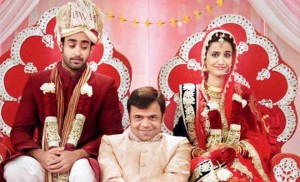
BAANKEY KI CRAZY BARAAT
By far, Rajpal Yadav’s most derelict and inane performance in a career of epileptic fit-themed performances. He stars as Baankey (again, with Sanjay Mishra around), a 35-year old man-child who hires a substitute groom to fill in for his own arranged wedding. Needless to mention, 60% of this “situational comedy” occurs at the marriage – where characters like Vijay Raaz, Aijaz Khan (who is also the director) and others contribute to the growing frustration of viewers. Bollywood’s wait for a decent half-witted comedy is, in itself, quite the frustrating situational comedy for hopeful film critics nowadays.
LAKHON HAI YAHAN DILWALE
Aditya Pancholi plays an abusive ex-con alcoholic Maharastrian husband. This is the kind of horribly made underdog-musical where soft, sullen voices are used to denote poverty in unusually big houses; where flying vegetables – notably cabbage and tomatoes – depict domestic scuffles in Maharastrian households; where the two leads sing elevator-version covers of beautiful 60s classics from Rafi to Nayyar, to signify fledging musical careers; where performing for rich folks and their parties seems to be the ultimate career ambition; where sunrise inserts look more like stop-motion experiments gone wrong; where dramatic zooms and pans onto a single glossy poster indicate the grandness of its publicity; where slates like ‘After Few Days’ and grammatically incorrect Rumi quotes appear at inopportune moments; where Anju Mahendru looks like she can’t quite believe how she has been stereotyped as the garishly made-up high society snob, and where guitars are strummed with one finger to sync with an entire orchestral piece. Music, RIP.
KIS KISKO PYAAR KARU
Yes, this Abbas-Mustan comedy about a philandering polygamous husband – who else but undercover feminist Kapil Sharma (in his debut) – is not even close to being remotely acceptable. It’s like the writers sat down and came up with one money shot – where the man waves goodbye from the society gate to three women on three separate balconies – and then concocted an entire 138-minute movie out of it. And Varun Sharma, stop being that whiny, annoying sidekick. You’re better than this.
OCTOBER
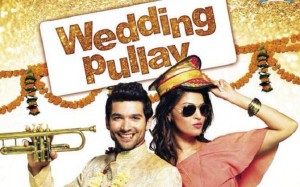
WEDDING PULAV
Ace DOP Binod Pradhan makes his directorial debut with this gooey mix of everything cinematically inedible, Wedding Pullav – the millionth Bollywood love triangle between clueless boy, best friend tomboy and bimbo fiancé. This is a more jarring, badly-acted version of Red Chillies’ “Always Kabhi Kabhie”, which was already horrendously awful in its own right. As side dishes, Parmeet Sethi and Kitu Gidwani play an estranged couple in this one – and we must see them fall back in love with the subtlety of a Dhoni hook-shot.
ONCE UPON A TIME IN BIHAR
What are Pankaj Jha and Ashish Vidhyarthi doing in this? Director Nitin Chandra takes the Prakash Jha route, digs up real incidents, and attempts to present the frailties and fragilities of a system that has brought Bihar to the brink over the last decade. But there’s no bigger tragedy in cinema than ‘relevant’ films executed with the swagger of an orator in a graveyard. every sound is added in post- production, robbing the location of its personality. Live streets are pointless if every human being stares into the camera. Every long shot has people and even dogs’ gazes following the actors – like a guerrilla shoot gone wrong. Why do I even bother?
GUDDU KI GUN
The funniest part about ‘Guddu ki Gun’ is that it exists. It takes a special kind of talent to make a 130-minute film about a Bihari man with a penis of gold. You heard that right. Man With A Golden Gun. Goldmember. Ironman. Lord Of The Lings. Rod Is God. Lingam returns. All those lewd, vulgar sms jokes are now your worst nightmare. However, the unusual setting – Kolkata and all its quirks – provide for a rather schizophrenic mixture of elements. Khemu’s member gets stolen. He wants his mojo back – literally. The wild (golden) goose-chase happens across the city. A few quirky dons, submissive husbands, kinky foreigners, incompetent doctors and sidekicks are thrown in. If you’re still reading, this bizarre plot culminates in Priyadarshan fashion during a Mughal-e-Azam stage play.
NOVEMBER
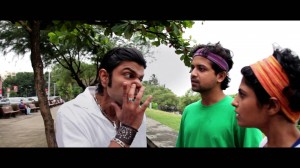
CHARLIE KE CHAKKAR MEIN
The opening credits of ‘Charlie ke Chakkar mein’ play over what looks like a condom ad gone wrong. One of the film’s 2500 mysterious characters writhes, naked, between satin sheets. “Who the eff is Charlie?” she sings. Lines of cocaine are then snorted, as if to immediately answer her distressed query. A police commissioner – played by Naseeruddin Shah, as if he were watching reruns of himself in ‘Sona Spa’ – tries to decode a case involving five destined-to-die Shaitaan-style youngsters by sifting through their recorded footage. Nobody cares about the ridiculous twists and turns by the end. The only twist in this thriller is its lack of thrills and guile and overall sense of structuring a narrative. Also, Amit Sial – who has also written this – needs to pull up his socks. What is this nonsense?
RUN BHUUMI
The full title is Run Bhuumi – Champs Don’t Cry. (Never give up. Hey, always try. Champs don’t cry.) This film is a result of ‘Jo Jeeta Wohi Sikandar’ being dismantled and reassembled by newly-rich folk who think that cinema is an open-for-all free fast-food restaurant. Bhuumi, the only 14-year old girl sprinter in Kasauli, needs 8 lakhs to fund her kid brother’s generic blood-clot operation. Not surprisingly, this comatose brother is far more expressive than the adults in this film. Does her conflicted mannequin-invoking coach do the right thing and choose her to represent his school so that she can win 10 lakhs (yes, prize money)? Or does he display the moral compass of Lance Armstrong and choose a politician’s son to fund his own dream academy? Take a wild guess.
DECEMBER
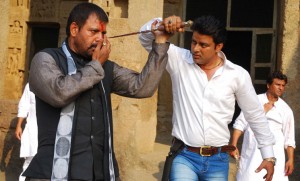
SORRY DADDY
The hero is an honest cop named Ravi Sharma (Shameem Khan). He can’t possibly be an actor. Every few scenes, the chap looks up at his deceased wife’s photograph, the camera zooms onto his face, an all-male choir belts out a tragic theme, and he curls his lips with unprecedented emotion. Inspector Ravi must defy the laws of acting, physics, chemistry, motion, emotion and films in general to save a kid who has been sucked into a begging racket by villains in a rocky Film-City lair. This film looks to have been made by a small-time Jogeshwari gangster looking to teach his community about the importance of children. Raza Murad’s distinctive baritone spouts moral science lessons every few scenes. One of the begging kingpins is shown praying to yesteryear actor Jeevan’s portrait. The iconic ‘gunda’ Razzak Khan pops into the film in yellow pants to provide comic relief. And so on.
THE SILENT HEROES
Again, the intentions are good – sort of. The premise clumsily tries to connect two of the filmmaker’s primary passions: mountaineering and children. Somehow, the fate of mankind (and of a particular overzealous Hindi news channel) depends on a high-altitude expedition of 13 deaf children. The selling point is that these kids are deaf and mute in real life – and the director’s name is Mahesh Bhatt. He then employs able actors who are unable to emote, a technical crew unable to distinguish between day and night, and a script that would be far more respectful in a primary school textbook. I feel sorry for the hard-working kids, who are made to brave freezing weather, treacherous conditions and mediocre filmmakers.

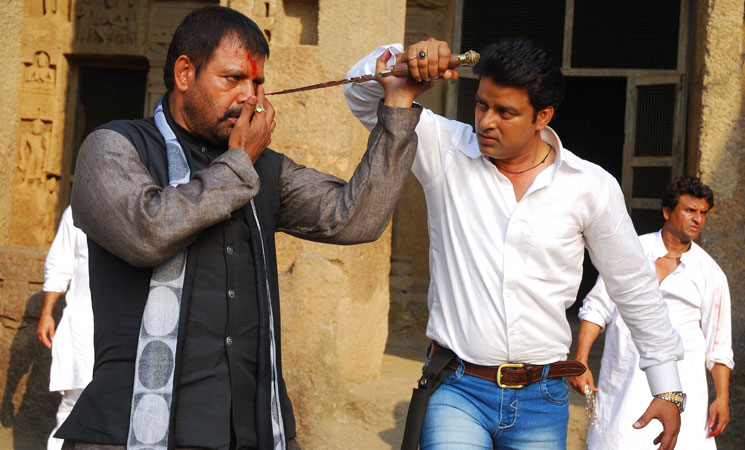
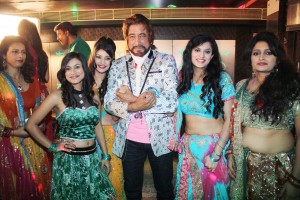
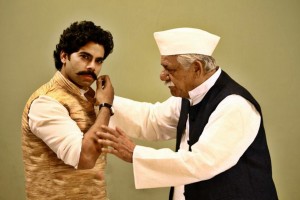

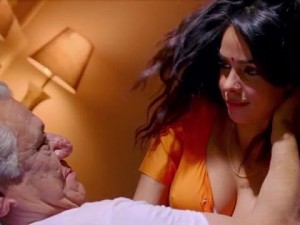
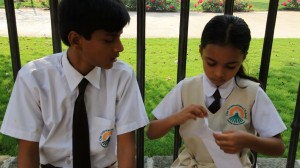
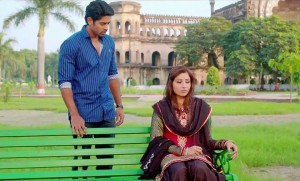




Leave A Comment
You must be logged in to post a comment.